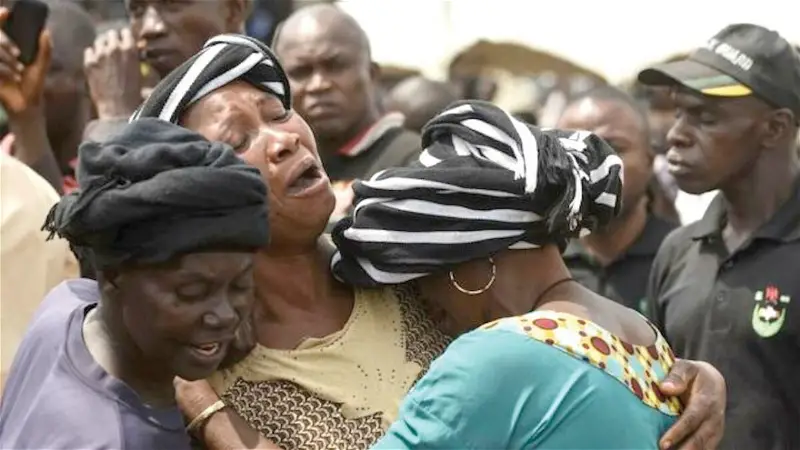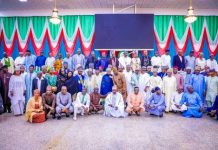About five years ago, the Berom and Irigwe people of Plateau State’s northern region seized every accessible outlet to protest the takeover and renaming of their settlements. Still, several questioned whether such an event was truly possible.
Former Governor Jonah Jang, Senator Istifanus Gyang, who represented the Barkin Ladi/Riyom federal constituency at the time; the Gbong Gwom Jos, Da Jacob Buba; all Berom Socio-cultural groups, particularly its umbrella body, Berom Educational and Cultural Organisation, BECO; and the Irigwes of Bassa local government area, among others, have all consistently urged the Federal Government to address land occupation by foreign herders.
The Beroms pointed out some of the communities attacked since 2001 to include “Rotchun (aka Rafin Acha), Dankum (renamed “Mahanga”), Hywa (renamed “Lugere”), Fass (renamed “Tafawa”), Davwak, Chwelnyap, Lyoho Dakar, Angwan Dalyop, Janda, Darin, Shong I, Shong II; Rakweng; Dashugu; Diyan-Hei; Maseh (renamed “Lugel”), Kampwas, Kasa, Zere, Ninja-Hei, Sei, Nicha, Pwabeduk, Hyai, Kufang, Sharu, Dogo, Ningon, Rantis, Angio, Kachin, Shonong, Rahol-Mazat, Chikogo, Ranchol, Nangam, Kak, Dajak, Rarin, Kujei, Attakar, Nantwa and some parts of Bisichi, Kai, Rahol, Luk-Fei, Mallel, Bel, Rahei, Zim, Jong, Rabuk, Lobiring and Gwara Dadep.
Natives of these areas are unable to return home because they have up to now blended into safer communities.
Unfortunately, with the recent attacks and displacements throughout villages in Mangu and Bokkos, the two local government districts most affected in the zone, the crisis has spread to neighbouring communities in the Central section of the Plateau.
Mangu, the home of the Mwaghavul tribe, saw over 200 deaths between April and July of 2023. Chief Joseph Gwankat, National President of the Mwaghavul Development Association, listed the following communities as having been overrun: “Murish, Dungmunan, Kubat, Tim Naanle, Pil, Fungzai, Manja, Chisu, Fungkipang, Nting, Jwaktumbi, Kantoma, Mangul, Alohom 1, Alohom 2, Gongon, Dan Hausa, Kikyau 1, Kikyau 2, Gudum, Tyop, Kwaskipanleng, Gaude, Bure, Ntam, Jwak Raas, Mper.”
“Washna, Jwak Chom, Larkas, Fushi, Kwahas, Dangdai, Atuhun, Adep, Ajing, Milet, Daika, Dikong, Lakopal, Kogul, Niyes, Lakasi, Gwet 1, Gwet 2, Mutong, Keptul, Gung, Pyantuhul, Kus Hi, Nbwor, Vodni, Pwaskop, Nten, Konji, Niyes, Kogul,” and most recently, Lar’apya.
Mutfet, Ndun, Sanyan, Kyong, Kop, Mandarken, Lunghai, Chirang, Makundang, Fashar, Garau, Mbong, Tahore, Tamiso, Wang, Hirpiya, Butura Kampani, Maijankai, Dares, Kamluk, Sundul, Garah Mushere, Kambar Mupeli, Mbar Fiton, and other settlements were among those who were targeted in December of last year in Bokkos.
During these attacks, around 200 people lost their lives. The survivors of the attacks have left these towns, and there are rumours that odd people are moving into their houses, harvesting their crops on their fields, and doing artisanal mining, or “guza,” as it is called in the area. The indigenous people demand a thorough examination of Mahanga, a Fulani stronghold where there are numerous rumours of weapons hoarding and planned attacks within the State.
Although the indigenous people from various tribes perceive the frequent assaults as an attempt to seize territory, the Miyetti Allah Cattle Breeders Association of Nigeria (MACBAN), an umbrella organisation for herders, denies this accusation, claiming that its members are not the ones behind the attacks.
Former governor Jang noted that the people have continued to “bear the brunt of terrorists who seem to have sworn to dispossess them of their heritage at all costs. That these killers are out on a cleansing agenda and plan to take over the lands of the people they try to wipe out is no longer hidden.”
He added, “There is the need to attend to the call for State police as part of measures for boosting security, ensuring early response in crises, and confronting the challenges headlong. The killings are getting out of hand and the State Police option is viable for nipping these massacres in the bud.”
The Senator representing Plateau Central in the National Assembly, Diket Plang stated, “… facts on the ground reveal that there is forceful occupation of attacked communities which is a pointer that land grabbing is real in the State… We need a permanent solution to the Plateau issue, criminality has crept in, and security should be heightened at the entry and exit points in the State… The Plateau issue should be more nationalistic. There is the aspect of land grabbing, the facts are there.
“The humanitarian assistance should include the provision of building materials for the rebuilding of destroyed homes so that the owners could return home and the security personnel should be stationed at strategic locations to give the people a sense of safety… We need to change our grazing policy and adopt technology in livestock and crop agriculture, your profession should not impede on mine…”
But the State MACBAN Chairman, Nura Muhammad said, “The issue of land grabbing has been over-flogged. There is nothing like that, it is just that we are killing ourselves and people are living apart. Let’s live in peace with one another and there should be a synergy with all stakeholders.”
Operation Safe Haven, keeping the peace in the State didn’t respond to questions about the insinuation about Mahanga as its spokesman, Captain James Oya could not be reached at the time of the report but Muhammad quoted earlier noted, “Mahanga is a village like any other in Plateau State, it is just that it is inhabited by the Fulani that is why all these things are being said.”







